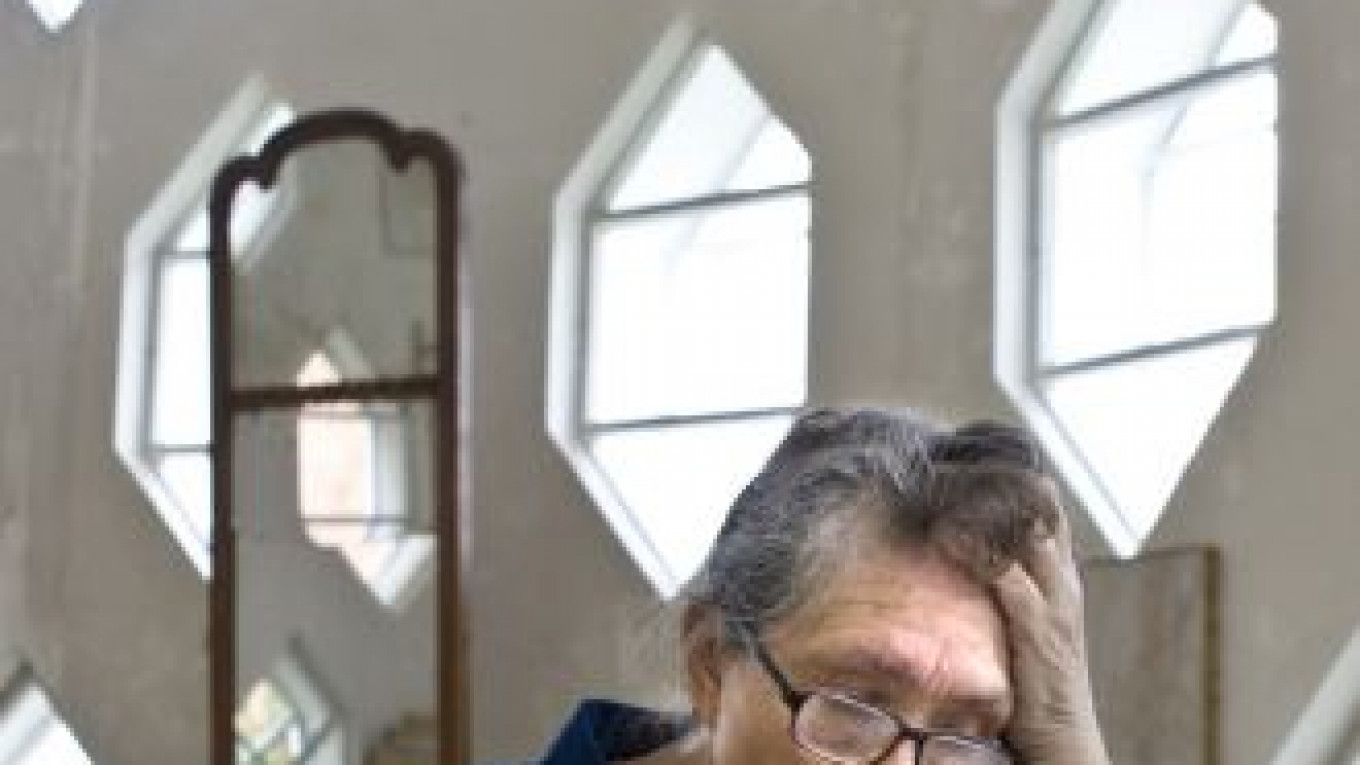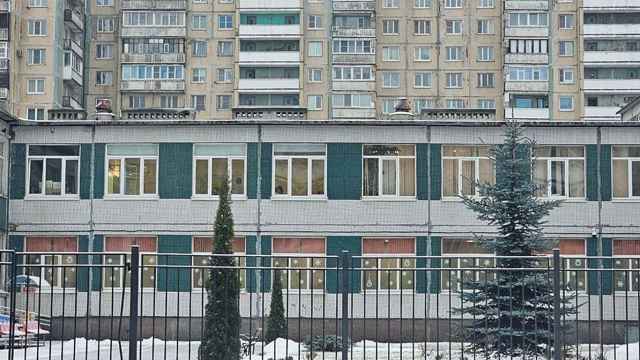An architectural landmark in central Moscow built by Soviet architect and painter Konstantin Melnikov has found itself at the center of two large building sites.
According to Yekaterina Karinskaya, the architect's granddaughter, construction of a 72-car underground garage and three-story shopping center on the Arbat commenced recently. Residents were not informed about the plans, she told The Moscow Times.
"From midnight to 5 a.m. for the last two nights huge trucks of earth have driven past. The whole Arbat shakes during those five hours," said Karinskaya, who currently resides in the house. "The company in charge was not able to present any documents to legitimize the project. They have no permission to conduct construction work here."
A meeting of company representatives, held last Thursday at the Arbat district council, turned into complete commotion when uninvited local residents arrived.
Press was told the event was a "work meeting" and refused entry. Residents who were allowed in started leaving within 20 minutes, claiming the meeting was a waste of time and no one could get a word in edgeways, said a Moscow Times reporter who attended.
The house, built in 1929 on Krivoarbatsky Pereulok, has changed hands on a number of occasions since Melnikov's death in 1974. Transformation of the building into a museum devoted to the architect's work has been in the pipeline since 1989, but ownership disputes have hindered the process.
In December 2010, senator Sergei Gordeyev donated his half-ownership of the house to the state, on the condition that the latter turn it into a museum. Karinskaya, who holds 50 percent ownership rights, has now devoted herself to the cause.
In an interview with The Moscow Times, she said she had been relentlessly writing to government ministers and cultural institutions for the past few years, calling for a ban on the building works and a revival of efforts to create a state museum.
"Within the past six months I have probably written to [Mayor Sergei] Sobyanin six times," she said. "I have not received a single response."
In two of her letters to the mayor, Karinskaya refers to preparations being made to construct an underground car park.
Currently, there is a large pit in the neighboring yard that she claims is endangering the stability of the already deteriorating property.
The house is composed of two interlocking cylinders studded with 57 hexagonal windows, and has been recognized internationally as an architectural masterpiece.
Yegor Yegorychev, a researcher into Melnikov's work, said that the architect was granted permission to forego official Soviet building regulations and thus able to take risks with the design.
As a result, the main facade of the building does not align precisely with its base, which puts a strain on its foundations. Furthermore, various construction projects in past decades have raised the level of surrounding land, leaving the base susceptible to damage from water flows.
Natalya Samover, coordinator of preservationist organization Arkhnadzor, elaborated during a telephone interview that these foundations are cracking under the weight of the structure, and water coming from the construction sites only exacerbates the problem.
"Disruption of earth caused by water currents can already be observed in the area. Construction of another large building with a deep underground car park can spell disaster not only for [the house] but also for surrounding buildings," she told The Moscow Times. "I believe this is currently the most worrying situation related to construction on a historical site in Moscow."
Yury Prokofyev, deputy director of construction company Senab Proekt, which is carrying out the building works, said that the anger expressed by local residents is perfectly natural.
"This reaction is typical of residents when construction works are taking place near their homes. All these pretty phrases — 'The Arbat is overbuilt,' 'we don't need this' — are an effort to gain something from the situation. The work will take place no matter what — they know they will have to bear it for the next two years so they see an opportunity to benefit," he said in a telephone interview.
When questioned about the potential damage to Melnikov's house, Prokofyev rejected the claim that the work poses a danger to the structure. "We are not touching the house, nothing will happen to it. The fact that it's in a bad condition is the fault of the owners. Melnikov did not intend for the house to stand for 100 years when he built it."
He put the disruption during the first two nights of construction down to a malfunction of one of the work vehicles, which had to be replaced. Noise levels are now low, he claims. Documents requested by residents are being prepared by the client company and will be made available to the Arbat district council shortly, he added.
Repeated attempts to contact the client company, Trust Oil, were unsuccessful.
Whatever the outcome of Karinskaya and Arkhnadzor's efforts to preserve the endangered landmark, the building works seem set to continue. Both parties seem pretty definite on their plan of action during the upcoming weeks, however.
"Our organization … will support the efforts of local residents to bring about a reassessment of the way in which the building project is being undertaken," Samover said. "The Arbat is already overbuilt — construction of another huge commercial building on the street cannot be justified."
Yegorychev and Karinskaya appeared more optimistic. "What are we going to do now? The same thing we do every day: try to save Melnikov's house," they laughed.
A Message from The Moscow Times:
Dear readers,
We are facing unprecedented challenges. Russia's Prosecutor General's Office has designated The Moscow Times as an "undesirable" organization, criminalizing our work and putting our staff at risk of prosecution. This follows our earlier unjust labeling as a "foreign agent."
These actions are direct attempts to silence independent journalism in Russia. The authorities claim our work "discredits the decisions of the Russian leadership." We see things differently: we strive to provide accurate, unbiased reporting on Russia.
We, the journalists of The Moscow Times, refuse to be silenced. But to continue our work, we need your help.
Your support, no matter how small, makes a world of difference. If you can, please support us monthly starting from just $2. It's quick to set up, and every contribution makes a significant impact.
By supporting The Moscow Times, you're defending open, independent journalism in the face of repression. Thank you for standing with us.
Remind me later.






